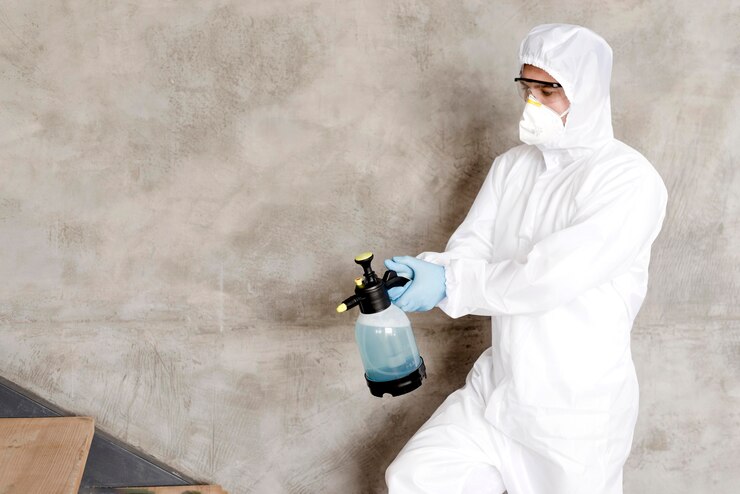How Much Do Mold Remediation Specialists Make?
Mold remediation specialists play a vital role in ensuring buildings are safe and free from harmful mold. Their work involves assessing mold growth, containing and removing contaminated materials, and restoring the affected area to its original condition, or better. This job is not only technically demanding and requires a keen eye for detail, but it also necessitates a high degree of responsibility, as the health implications of mold exposure can be significant. The salary of mold remediation specialists is a reflection of the skill and risk involved in the profession.
Salaries in mold remediation vary across states and experience levels. Factors that influence a mold remediation specialist’s earnings include geographic location, individual certification and training, years of experience in the field, and the current job market demand for these specialists. While some may work for established companies, others may choose to operate their own businesses, which can also affect their overall compensation.
Key Takeaways
- Mold remediation specialists are crucial for health and safety in the built environment.
- Earnings in mold remediation are influenced by location, experience, and certifications.
- The job market for mold remediation specialists is dynamic, with various opportunities for career advancement.
Overview of Mold Remediation
Mold remediation is a specialized process to remove mold from indoor environments, safeguarding buildings and health. It involves a combination of procedures aimed at addressing mold issues by identifying, isolating, and removing mold-contaminated materials.
What Is Defining Mold Remediation?
Mold remediation encompasses the systematic steps taken to eliminate mold growth in a property. Key aspects include:
- Inspection and Assessment: Professionals determine the mold’s extent and source.
- Containment: Preventing mold from spreading to uncontaminated areas.
- Filtration: HEPA filters are used to cleanse the air of mold spores.
- Removal: Contaminated materials are either cleaned or discarded.
- Drying: Ensuring all areas are moisture-free to prevent recurrence.
- Repair and Reconstruction: Replacing removed materials to restore the affected property.
Why Is Importance of Mold Remediation in Public Health Significant?
Mold remediation is critical for public health due to its impact on indoor air quality. Mold can cause:
- Respiratory Issues: Such as allergies and asthma in sensitive individuals.
- Long-Term Health Problems: Prolonged exposure can lead to severe health complications.
Therefore, mold remediation not only ensures the structural integrity of buildings but also the health and well-being of occupants.
Primary Roles in Mold Remediation
In the field of mold remediation, several key roles are instrumental in ensuring that mold removal and cleanup processes are carried out efficiently and effectively. These professionals are critical in maintaining healthy indoor environments and preventing the negative impacts of mold.
What Does a Remediation Specialist Do?
A Remediation Specialist is chiefly responsible for the hands-on work of removing mold from afflicted properties. They perform tasks such as removing damaged materials, cleaning infested areas, and applying treatments to prevent future mold growth. Their skills are acknowledged through certifications like the Mold Remediation Specialist (MRS) which verifies their proficiency in these tasks.
What Is the Role of a Remediation Technician?
A Remediation Technician works on the ground, often following the plans laid out by the remediation specialist. They are tasked with identifying mold hazards, suggesting improvements to the mold remediation system, and executing the physical labor required to mitigate mold issues. They may also be involved in setting up and maintaining containment areas during the remediation process.
What Are the Responsibilities of a Remediation Manager?
The Remediation Manager oversees the entire remediation project. This includes planning, budgeting, and managing personnel to ensure that the project is completed within scope. They also communicate with property owners and other stakeholders, providing them with critical information and updates on the progression of the mold remediation process.
How Does a Remediation Analyst Contribute?
Remediation Analysts are tasked with the analysis and evaluation of mold problems. They may conduct inspections to assess mold damage and determine the scope of contamination. Detailed reporting and recommendations for remediation plans are typical outputs from a remediation analyst to inform decision-making by other professionals in the field.
Certification and Training
The career of a mold remediation specialist is structured upon a foundation of professional certifications and hands-on training programs. Certifications are essential to validate one’s expertise, while training programs and apprenticeships offer the necessary skills to perform mold inspections and mold testing effectively.
What Are the Required Certifications for Specialists?
For an individual to become a Certified Mold Inspector (CMI) or a Mold Remediation Specialist (MRS), several key certifications are typically required. These often include industry-recognized certifications such as the Mold Remediation Specialist (MRS) offered by the Institute of Inspection, Cleaning and Restoration Certification (IICRC). Certifications ensure that the specialist is competent in performing mold remediation, designing and maintaining containments, and controlling pressure differentials.
- Essential Certifications:
- IICRC Mold Remediation Specialist (MRS)
- MICRO CMRC (Certified Mold Remediation Contractor)
What Training Programs and Apprenticeships Are Available?
Specialists usually undergo comprehensive training programs or participate in apprenticeships to gain practical experience. For example, the Building Performance Association offers a detailed Mold Remediation Training course, preparing participants for exam certification.
- Key Training Aspects:
- In-depth mold remediation processes
- Hands-on mold inspections and mold testing techniques
- Maintaining safety and industry standards
Training courses such as a 30-hour online multimedia program, leading to nationally-recognized certifications like the MICRO CMRC, help mold remediators become highly skilled at spotting mold issues, effectively isolating and removing contaminated materials, and understanding the intricacies of mold in various environments.
Economic Factors Influencing Salary
When considering the salaries of mold remediation specialists, it is critical to understand how economic factors such as location and cost of living affect their earnings.
How Does Impact of Location on Salary?
The salary that mold remediation specialists command varies considerably across different states and cities. For example, specialists in Washington state enjoy salaries that are 16.9% higher than the national average. This can be attributed to the higher demand for mold remediation services in certain locations, which drives up wages. Conversely, in areas where mold remediation is less in demand, or the market is saturated with professionals, salaries tend to be lower.
What Are Cost of Living Considerations?
The cost of living in different areas has a direct influence on mold remediation salaries. In regions such as New Jersey or New York, where the cost of living is significantly higher than the national average, salaries are generally adjusted upwards to reflect these expenses. However, even with higher wages, the actual purchasing power may not be as robust due to the high costs associated with living in these states. On the other hand, a state like Pennsylvania might offer a lower average salary but a relatively lower cost of living, allowing for a better overall financial situation for some individuals.
The salary range for mold remediation workers often reflects these economic factors, illustrating how a specialist’s location and surrounding financial landscape shape their salary. For instance, as of 2024, the average hourly pay for a Mold Remediation in the United States is $30.22, with this figure fluctuating depending on local economic conditions.
Experience and Salary Progression
When entering the mold remediation industry, specialists can expect their salaries to vary based on experience. Starting salaries will typically be lower, with the potential for earnings to increase as they gain more experience and expertise in the field.
What Are Average Starting Salaries?
The average starting salary for a mold remediation specialist is often determined by the regional cost of living and the starting hourly wage offered by employers. Entry-level technicians can expect to earn a salary range that reflects their lack of industry experience and necessary supervision. For example, ZipRecruiter lists an annual average starting salaryaround the low $30,000s, but these figures can fluctuate based on location and company size.
How High Can Mid-Career Earnings Potential Reach?
As mold remediation specialists progress to mid-career, they often see a significant increase in earnings potential. Factors such as certifications, specialized training, and years of hands-on experience contribute to higher salaries. According to industry data, mid-level technicians can expect their average salary to reach figures close to or slightly above the national average, depending on their geographic location and the employers they work for.
What Is the Salary Growth with Experience?
Salary growth with experience in the mold remediation industry aligns closely with the specialist’s ability to manage more complex projects and their capability to take on leadership roles. Over time, experienced specialists may see their salaries increase well above the average, especially if they progress into managerial positions or start their own businesses. The hourly wage typically improves with experience, with senior technicians potentially earning a significantly higher annual hourly salary.
Benefits and Compensation
In the mold remediation industry, compensation extends beyond the hourly wage or salary. Specialists often receive comprehensive benefits packages that contribute to their total compensation.
What Are the Healthcare Benefits?
Most employers offer healthcare benefits to mold remediation specialists. This usually includes medical, dental, and vision insurance. The specific details, such as coverage levels and employee contributions, can vary greatly between companies. For example, according to ZipRecruiter, the average hourly pay for a Mold Remediation in the United States is $30.22, which may include healthcare benefits as part of the compensation package.
How Are Retirement and Pension Plans Structured?
Retirement planning is an important aspect of employee benefits. Many companies provide 401(k) plans to help workers save for retirement, often with an employer match contribution. Pension plans, although less common, are also offered in some cases, providing a fixed income upon retirement based on years of service and salary history.
What Additional Employee Benefits Are Provided?
Besides healthcare and retirement, mold remediation specialists may have access to a variety of additional employee benefits. These can include:
- Paid Time Off (PTO): Including vacation days, sick days, and holidays.
- Disability Insurance: Short-term or long-term disability coverage to protect against loss of income due to illness or injury.
- Social Security Benefits: For retirement, disability, and survivorship.
- Employee Assistance Programs (EAPs): Offering counseling and support services.
Employers may also provide specialized training programs to enhance job performance and safety.
Job Market and Opportunities
The mold remediation industry presents a plethora of job openings and a positive career outlook. Specialists enjoy competitive salaries and varied career options among similar companies within the sector.
What Are the Current Job Openings in Mold Remediation?
Mold remediation is a growing field with numerous job openings nationwide. For instance, listings on ZipRecruiter highlight that the job market in Chicago, IL is especially active with remediation roles offering an average pay of approximately $31 per hour. This indicates that those seeking employment in the mold remediation industry have a breadth of opportunities in various locations, potentially commanding salaries above the national average.
What Is the Career Outlook for Remediation Specialists?
Career prospects for mold remediation specialists appear robust. As environments are increasingly scrutinized for health and safety standards, the demand for skilled professionals in this area is likely to grow. Remediation specialists are key in identifying, analyzing, and resolving air quality hazards, ensuring the integrity of indoor environments, which suggests a stable path forward for individuals in this profession.
How Do Peer Companies Compare in the Mold Remediation Market?
When comparing peer companies, it’s notable that specialists might encounter some variance in compensation and opportunities. Glassdoor reports the potential annual earnings for a mold remediation worker to be around $57,958, with an average salary of $51,354. This suggests that some companies may offer higher remuneration than others, indicating an opportunity for remediation specialists to seek employment with companies that value their expertise and offer competitive packages.
Administrative Roles in Mold Remediation
In the field of mold remediation, administrative roles play a pivotal part in maintaining operational efficiency and organizational effectiveness. These positions, including the Director of Operations and the various administrative assistance and support roles, are essential in ensuring that remediation projects are executed smoothly and in a timely manner.
Who is the Director of Operations?
The Director of Operations in mold remediation is responsible for overseeing all aspects of a company’s operations. This usually includes strategic planning, project management, and adherence to industry standards. They take the lead in scheduling projects, coordinating with technicians, and ensuring compliance with health and safety regulations. Their role is not only to direct field operations but also to manage the business side of the company, which makes their contribution crucial to the success of mold remediation efforts.
What Do Administrative Assistants and Support Staff Do?
Administrative Assistants and support staff in mold remediation fulfill a range of duties that keep the business operating smoothly. They often serve as the first point of contact for clients, handling scheduling of appointments and coordinating communication between clients and technicians. Administrative support staff are responsible for a variety of tasks, including but not limited to:
- Organizing and maintaining files
- Managing correspondence
- Preparing reports and documentation
- Assisting with billing and bookkeeping
These roles require high organizational skills and attention to detail to ensure that the administrative side supports the operational needs effectively.
Frequently Asked Questions
Exploring the earnings within mold remediation reveals a landscape of varying salaries influenced by location, experience, and qualifications.
What is the average annual income for mold remediation professionals?
Income for mold remediation specialists varies, but on average, they can expect to earn around $62,857 per year.
Are earnings for mold remediation specialists higher in certain states?
Yes, some states such as Washington offer higher-than-average salaries for mold remediation jobs, with figures surpassing the national average.
What are the factors that influence a mold remediation specialist’s salary?
Key factors include geographic location, the demand for services, level of expertise, years of experience, and the presence of certifications.
Can experience significantly affect the earnings of mold remediation experts?
Indeed, seasoned experts with years of involvement in mold remediation tend to command higher wages than those new to the field.
What additional certifications can increase a mold remediation specialist’s salary?
Certifications such as a Council-certified Microbial Remediation Supervisor can bolster a specialist’s credentials and potentially lead to higher earnings.
How does the income of a mold inspector compare to that of a remediation specialist?
Mold inspectors often earn salaries comparable to remediation specialists, though this can depend on additional factors such as the scope of services they provide and their experience level.






